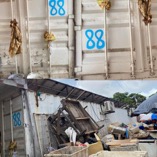
Since the cold storage was launched in the heart of the market to ensure that the risk of spoilage of vegetables is reduced or eliminated, women vendors at Serekunda market say they are yet to utilise it or reap its benefit.
While the project was vital to the vendors, the use of it has been derailed for about three years since its installation in 2020.
When the container was installed, a lady the vendors believed was part of the initiative recorded their names and phone numbers but nothing came out of that.
This reporter visited the market to get first-hand information about the situation and difficulties of storage facilities most of the women vendors face as the vegetable and fish business thrives, many complain about the inadequate storage facilities at the market. Others express dismay and continue to appeal for effective and efficient cold storage facility at the market.
“They have not told us anything since the installation of the cold storage and we thought the lady who recorded our names and phone numbers would get back to us but she has not,” said Fanta Saidy, a fish seller.
Most of the women share the same sentiment that the cold storage occupies the market space but it has been of no use to them since it was installed.
Mariama Drammeh, sea-food seller at the market, said she face difficulties storing her goods and they get spoiled or rotten if they are not sold during the day, adding that they have no place or cold storage to preserve their products.
Mansata Tamba, a vendor , also pointed out that since their names were recorded by the said woman for the use of the cold storage, she had never got back to them. “I thought she travelled that is why she is yet to get back to us,” she assumed.
However, in an interview with the assistant market manager, Baboucarr Jallow, he stated that the solar-powered cold storage was beneficial to women vendors to store their vegetables.
He said they had developed a policy for each to pay 10 dalasis if they were to keep their products for the next day. Within a week, Jallow said, the women stopped storing their vegetables and avoided the container. “The container is now abandoned,” he said.
Mr Jallow also said a lady (Aji Fatou Jallow) who was responsible for the solar-powered container told them that the container would need more air conditioners for fish and other merchandise but nothing came out of that.
Some the women interviewed said the lady (Ajie Fatou Jallow) who recorded their names signed a Memorandum of Understanding with the KMC for her to take up the responsibilities of the storage but unfortunately she could not do much, which had led to the ineffectiveness of the container or storage facility.
During a phone interview with Lamin Sanyang, Director of Services at the KMC, he said the lady informed them that she was on the verge of giving back the project she signed with the council.
He said the lady told them the lack of operation of the solar-powered container was due to personal reasons but she was willing to hand over the work to the council anytime soon.
The Serrekunda market is the biggest one in The Gambia, yet vendors complain about storage facility.
The Serrekunda market is situated in the bustling commercial center of The Gambia. It is sandwiched by buildings of workshops, trading stalls, eateries, and demarcated structures like the ‘black market’ where electronic gadgets are sold and repaired day and night.
The market is in the heart of the town and research has it that it was originally started by several women regularly setting up their stalls by a mud path selling a few fresh vegetables and dried fish. As time went by other local food sellers joined them and it subsequently grew into the busy market centre it is today.
While the issue of the storage facility is still unresolved, foodstuffs at the market continue to rot, which will not only cause a substantial loss to the vendors but also lead to food insufficiency in the city centre and its environs.
In a country where the government in partnership with the British High Commission and international organisations like Food and Agricultural Organization and World Food Programme are working hard to ensure there is food self-sufficiency, having substantial essential foodstuffs perishing day in day out is like throwing a spanner into the works or putting a spoke in the wheel of the efforts of the authorities and their partners in development.
Meanwhile, the Kanifing Municipality Council in direct control of affairs at the market is expected to resolve the issue.
Read Other Articles In Headlines
Public Holiday Declared for Mayoral and Chairperson Elections
May 19, 2023, 11:41 AM




